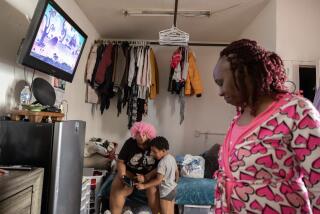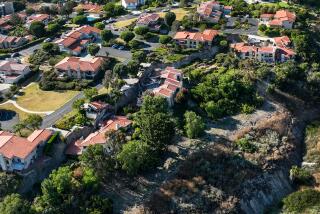Builder trying to wash his hands of seeping-water problem
- Share via
Question: I bought a new house three years ago. The structure has concrete block walls and a slab foundation. I’ve noticed white mineral deposits on some of the interior walls around the doors and windows, and moisture on some walls when it rains. Recently, the Pergo floors buckled, and some electrical outlets are no longer working. I’ve notified the builder, but he shows no interest or concern. What should I do? By the way, the builder is also carrying the note on the property.
Answer: It appears that you have serious construction defects. Groundwater, rainwater or both are penetrating the walls and possibly the slab floor as well. My first suspicion is that portions of the walls and slab are below the outside grade level, they were not sufficiently waterproofed and no ground drainage system was installed around the building.
Correcting problems of this kind and repairing the damage to the flooring and the electrical outlets could be very expensive. Without question, it is the responsibility of the builder to remedy all of these problems.
You need a comprehensive evaluation of the home by a qualified inspector. The inspection is likely to reveal additional defects that have not yet come to your attention.
If the builder is not willing to rectify these issues, you should seek legal advice. If it becomes necessary to hire another contractor to make repairs, perhaps the builder’s note on the property should be reduced to offset your costs.
--
Danger sprouts from dead trees
Question: The neighbors who live behind us have three large, dead trees that border our fence. A few years ago, our insurance company informed us that they would no longer insure our roof because it has wood shingles. If our neighbors’ trees should fall on our roof, who would be responsible for the repair costs?
Answer: The exclusion of the roof by your insurance company may only involve fire damage or rain leakage. You should contact them to see if you would be covered for damages caused by a falling tree.
As for your neighbors, their dead trees constitute a significant public safety hazard. Notify them immediately that you want these trees removed and will hold them legally and financially responsible for any personal injuries or property damage that may be caused by their failure to do so.
If they do not respond, the municipal authorities should be notified. The appropriate agency should then give notice to your neighbors to have the trees removed. If your neighbors still fail to act, the municipality can remove the trees and bill your neighbor for the work.
--
Should testing firm do repairs?
Question: The people who are buying our home ordered a radon test. The radon readings in the basement were high, and the company that did the testing quoted $975 to mitigate the problem. We’re concerned that the company that provided the test is also proposing to do the repairs. Isn’t this a conflict of interest?
Answer: Conflicting interests of this kind occur in a number of service businesses, including termite extermination, roof repairs and many others. This kind of dual-purpose business, with inspections and repairs being performed by the same people, is likely to raise suspicions. But this conflict is only a problem when practiced by unethical people.
If you want to confirm the radon findings, order radon test canisters from an environmental testing lab and perform your own test. Also note that the price the company has quoted for mitigation is very reasonable.
--
To submit a question, go to www.housedetective.com.


